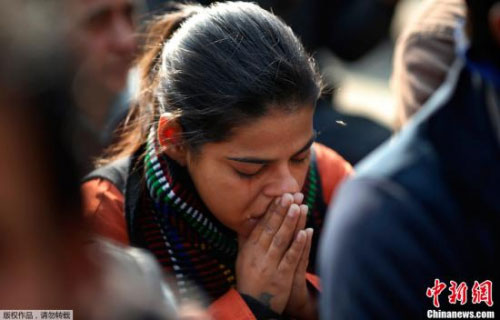BBC rape film triggers controversy in India
CRI, March 5, 2015 Adjust font size:
A major controversy has broken out in India ahead of the screening of a BBC documentary based on the brutal and fatal gang-rape of a 23-year-old medical student by six men on a moving bus in the national capital in December 2012.
 |
|
People gathered in the Indian capital to mourn for the victim of the gang-rape cases on December 29, 2012. [Photo: Chinanews.com] |
Facing massive uproar in Parliament, mostly from women lawmakers, the Indian government said on Wednesday the documentary would not be allowed to be telecast and a court injunction blocking the broadcast has also been obtained from a local court.
"When I heard about the documentary I was hurt. Under no circumstances should this be telecast. So we got a restraining order from the court," Indian Home Minister Rajnath Singh told Parliament.
He added: "We will investigate why permission was given at the first place to the documentary makers to interview one of six rapists on death row. Foreign governments will also be urged not to allow the documentary to be released."
Meanwhile, Delhi police chief B.S. Bassi said: "We urge the Indian media not to show it."
But what is the controversy all about?
In the documentary, "India's Daughter," Mukesh Singh, one of the rapists on death row, has been interviewed by British filmmaker Leslee Udwin at the high-secured Tihar jail. Mukesh has displayed an appalling lack of remorse and went to the extent of even blaming the woman for the rape.
Mukesh, sentenced to death by a fast-track court along with three others, has appealed against the sentence in the Supreme Court, where the case has now been pending for the last one year. The main accused Ram Singh committed suicide during the trial and another being a juvenile escaped death.
Experts are, however, divided on the issue of blocking the screening of the documentary, with some saying that the judiciary should speed up the dispensation of justice in cases like rape, instead of only banning it.
"Banning the documentary is not the answer. We have to confront the issue that men in India do not respect women and any time there is a rape, blame is put on the woman that she was indecently dressed, she provoked the men," said Anu Aga, a leading businesswoman and social activist.
Another expert, Prof. Ajay Singh, said: "In cases like rapes, the judiciary has to ensure that justice is delivered fast and not delayed. Even a fast-track court took seven months to give its judgment and the case has been lying in the Supreme Court for the last year."
The filmmaker has meanwhile said that she sought and got permission from the Indian Home Ministry to conduct the interview of one of the rapists. "I had applied for permission in May 2013 and I got the answer yes in two weeks," she told the media in the national capital.
Udwin has also defended her documentary during a discussion at a TV studio, saying it "tries to show the disease is not the rapists, the disease is in society."
The BBC has also defended the documentary.
"This harrowing documentary, made with the full support and cooperation of the victim's parents, provides a revealing insight into a horrific crime that sent shock waves around the world and led to protests across India demanding changes in attitudes towards women," a spokesperson said.